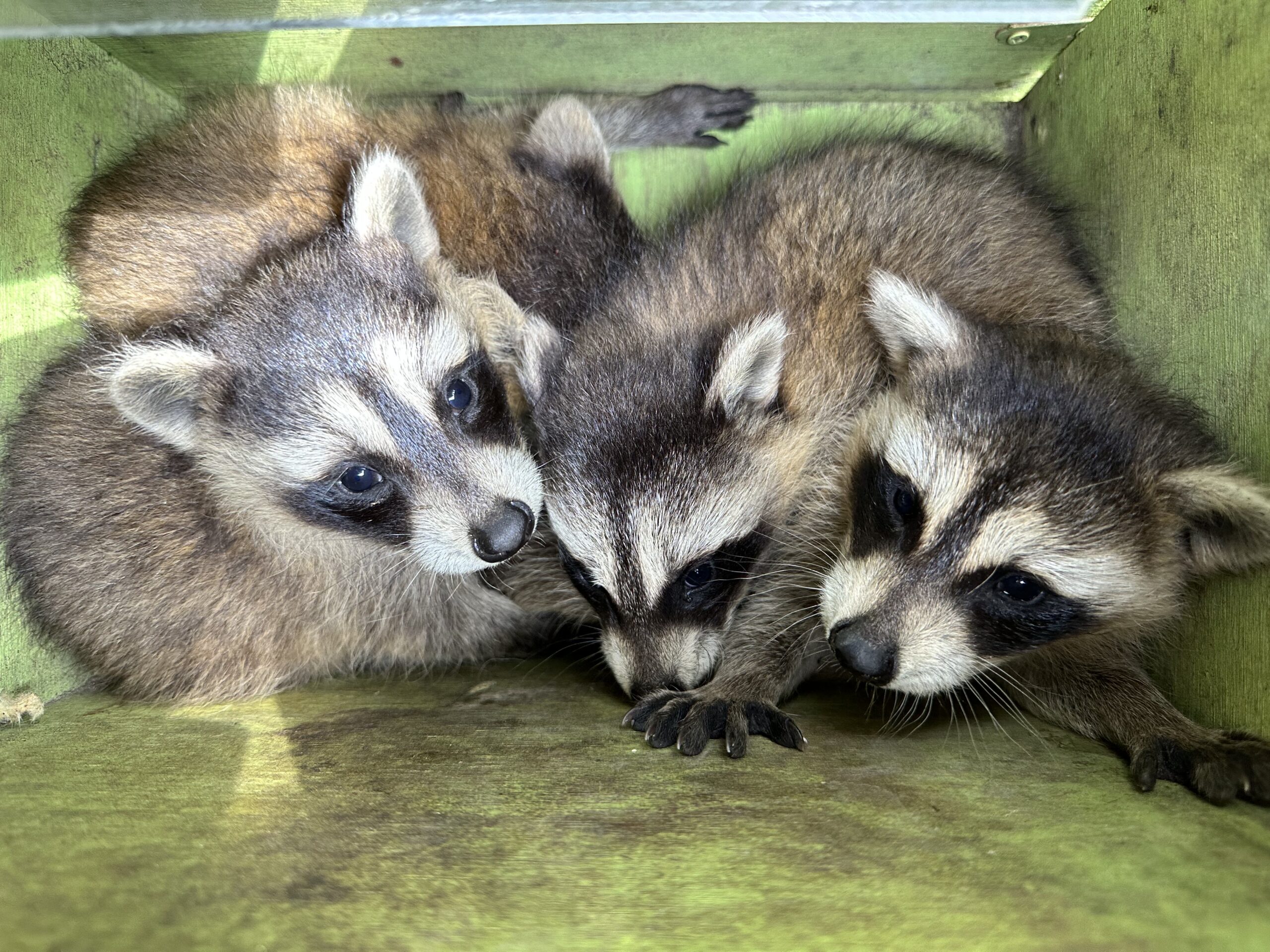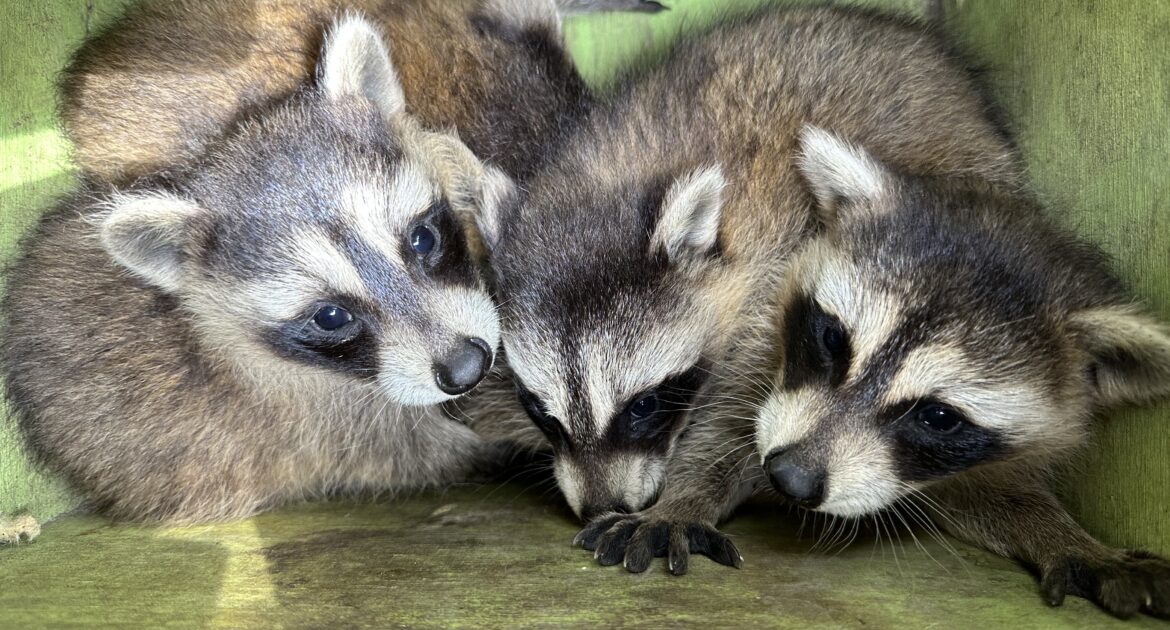Raccoons, with their striking facial masks and dexterous paws, embody the spirit of adaptability and intelligence in the animal kingdom. These nocturnal creatures have unearthed the art of survival, thriving in diverse environments, from urban landscapes to wooded areas. Their daily activities showcase a fascinating routine that involves foraging for food, playing, and establishing intricate social structures. As adept scavengers, raccoons possess an uncanny ability to navigate human environments, often seen rummaging through trash cans and exploring backyards, which leads to an ever-growing need for effective wildlife management.
In Montreal, the increasing presence of raccoons has underscored the importance of professional wildlife control. As we learn about the daily habits of these clever animals, it becomes clear that our role at Skedaddle Humane Wildlife Control is crucial in ensuring a balanced coexistence.
Join us as we dive into their behaviours, highlight the need for humane management, and explore how understanding their routines can help prevent conflicts. From understanding their sleeping patterns to their foraging habits, uncover the intricacies of raccoon life and our commitment to handling wildlife issues responsibly.
Morning Activities: Rest and Shelter
During the day, raccoons typically rest in secluded, safe spaces to avoid predators and disturbances. Common resting places include hollow trees, abandoned burrows, and even your attic or garage. These locations provide the shelter and security they need to sleep and recuperate.
However, raccoons choosing human structures for shelter can lead to a host of problems. They can damage insulation, chew through wires, and create unsanitary conditions with their droppings. Additionally, they might bring parasites into your home, posing health risks to your family and pets.
It’s essential to be proactive in identifying and sealing potential entry points around your property. Regular inspections can help ensure that raccoons do not turn your attic or basement into their daytime resting area.
Evening to Night: Foraging and Feeding
When the sun sets, raccoons come to life, embarking on their nightly quest for food. Their diet is incredibly varied, including fruits, nuts, insects, small animals, and even human leftovers. This adaptability makes them successful scavengers, able to find sustenance in both natural and urban environments.
A common problem in residential areas is raccoons raiding trash cans and gardens. They are known to tip over bins, scatter garbage, and feast on plants, leading to significant messes and potential damage. In some cases, they might even venture into homes through pet doors or open windows in search of a meal.
To mitigate these issues, homeowners can take several preventive measures. Securing trash cans with tight-fitting lids, using raccoon-proof compost bins, and harvesting garden produce promptly can help reduce the attractiveness of your property to these nocturnal foragers.
Nighttime Exploration and Social Interaction
Raccoons are not solitary animals; they often engage in social activities during their nightly explorations. They communicate through vocalizations, body language, and scent markings, forming loose social groups primarily composed of females and their young. These interactions are essential for their survival, helping them learn and share information about food sources and threats.
At night, raccoons can be found in various locations, from parks and wooded areas to backyards and urban streets. Their playful and curious nature often leads them to investigate new surroundings, sometimes resulting in accidental encounters with humans.
Observing raccoon behaviour can be a fascinating experience, but it’s important to maintain a safe distance. While they may appear friendly, they are still wild animals and can become aggressive if they feel threatened.
The Risks of Raccoon Infestations
If a raccoon makes it into your home, it is vital to be cautious. Raccoon infestations pose significant health and property risks that can affect families and communities. Understanding these dangers is vital to taking appropriate preventive measures. Below are the primary concerns associated with infestations:
- Rabies: Raccoons are known carriers of rabies, a lethal virus that is transmitted through bites or open wounds. If a raccoon bites a person or a pet, urgent medical attention is necessary to prevent the onset of this life-threatening disease.
- Zoonotic Diseases: Beyond rabies, raccoons can spread several other zoonotic diseases, including:
- Leptospirosis: Caused by bacteria found in raccoon urine, this disease can lead to serious kidney and liver damage in humans.
- Baylisascaris: This parasitic roundworm can be transmitted through contact with raccoon feces, leading to severe neurological issues if ingested.
- Salmonella: Often contracted through contaminated food or surfaces, this bacteria can cause gastrointestinal illness and serious complications.
- Property Damage: These adept scavengers can wreak havoc on properties, leading to costly repairs. Common damages include:
- Structural Damage: Raccoons may chew through insulation, wires, and wood structures in search of shelter, potentially compromising the integrity of roofs and attics.
- Contamination: Their droppings can contaminate insulation and living spaces, leading to unsanitary conditions and potential health risks.
- Garden Destruction: They often raid gardens and compost piles, causing noticeable damage to plants and landscapes.
It is clear that our homes and health can be at risk due to these infestations. Recognizing the dangers is the first step towards effective management and prevention, safeguarding our living environments against unwelcome intruders. Taking proactive measures ensures that we maintain a safe and comfortable space while respecting wildlife needs.
Why DIY Raccoon Control is Risky
While it may be tempting to handle raccoon problems on your own, DIY attempts at removal can be ineffective and dangerous. In many areas, it’s also illegal to trap and relocate raccoons without proper permits. Improper handling can lead to injuries, both to the homeowner and the animal, as well as potential legal consequences.
Raccoons are intelligent and resourceful, often finding ways to circumvent DIY exclusion methods. Without professional knowledge and tools, homeowners might only achieve temporary relief, with raccoons returning soon after. Additionally, the stress of dealing with a raccoon infestation can be overwhelming, especially when faced with the potential health risks and property damage.
For these reasons, it’s advisable to seek professional assistance for raccoon control. Experienced wildlife technicians can ensure the problem is addressed humanely and effectively, providing long-term solutions to keep your home raccoon-free.
Professional Raccoon Management by Skedaddle
At Skedaddle Humane Wildlife Control in Montreal, we understand the challenges homeowners face when dealing with raccoons. Our approach focuses on humane methods designed to protect both your property and the animals. We use innovative techniques such as one-way doors, allowing raccoons to exit but preventing re-entry.
Our experienced technicians are trained to identify and seal all potential entry points, ensuring raccoons cannot return. We also provide thorough clean-up and decontamination services, removing any health hazards left behind by the animals. Our commitment to humane wildlife control sets us apart, ensuring the safety and well-being of both our clients and the animals.
Choosing our professional services over DIY methods means you benefit from our expertise, experience, and dedication to customer education. We aim to provide peace of mind, knowing your raccoon problem is handled effectively and ethically.
The Benefits of Hiring Professional Wildlife Technicians
When you hire our expert wildlife technicians, you gain access to several key benefits. Our team is equipped with the knowledge and tools necessary to resolve raccoon infestations humanely and efficiently. We prioritize the safety of your family and pets, using non-lethal exclusion methods that comply with local regulations.
In addition to humane removal, we offer follow-up services to ensure raccoons do not return. Our technicians conduct comprehensive inspections, sealing any gaps or openings that raccoons might exploit. We also provide ongoing support and advice, helping you maintain a raccoon-free home.
By choosing Skedaddle Humane Wildlife Control, you’re investing in a solution that prioritizes long-term results and ethical treatment of animals. Our commitment to customer satisfaction and wildlife welfare makes us the right choice for raccoon removal and protection.
A Daunting Task
Dealing with raccoons can be a daunting task for any homeowner. However, with the right approach and professional support, you can protect your property and ensure the safety of your family. At Skedaddle Humane Wildlife Control in Montreal, we offer the expertise and humane methods needed to effectively manage raccoon infestations.
If you’re facing raccoon problems, don’t hesitate to reach out to us. Our team is ready to provide the solutions you need, ensuring your home remains raccoon-free. Contact us today to request a quote and learn more about our services. Together, we can create a safer, healthier living environment for you and your loved ones.




